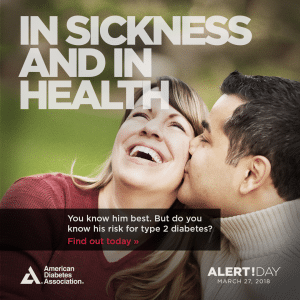Recognizing American Diabetes Association Alert Day
Posted By PVA Admin on March 26, 2018 Paralyzed Veterans of America (Paralyzed Veterans) is participating in American Diabetes Association Alert Day. March 27, serves as an annual reminder that diabetes is one of the most prevalent health risks today. In fact, more than 29 million Americans have diabetes and 86 million more are at risk to develop the disease. Veterans, especially those who were exposed to Agent Orange while serving in Vietnam, are especially vulnerable.
Paralyzed Veterans of America (Paralyzed Veterans) is participating in American Diabetes Association Alert Day. March 27, serves as an annual reminder that diabetes is one of the most prevalent health risks today. In fact, more than 29 million Americans have diabetes and 86 million more are at risk to develop the disease. Veterans, especially those who were exposed to Agent Orange while serving in Vietnam, are especially vulnerable.
What is diabetes?
Diabetes is a chronic disease in which the body cannot produce or properly use insulin. Normally, insulin brings sugar out of the bloodstream and into cells. If the body cannot make insulin or does not respond to it, the sugar stays in the bloodstream. As a result of high blood sugar levels, damage eventually occurs to blood vessels and organs.
Symptoms of diabetes include blurry vision, excessive thirst, fatigue, frequent urination, hunger, and weight loss. Persons with diabetes need to have their hemoglobin A1C levels checked every three to six months.
There are three major types of diabetes:
- Type 1 diabetes is usually diagnosed in childhood. In this type of diabetes the body makes little or no insulin, so daily injections of insulin are needed.
- Type 2 diabetes usually occurs in adults. With adult onset diabetes, the pancreas does not make enough insulin to keep blood glucose levels normal, often because the body does not respond well to insulin. More than 90 percent of adults with diabetes have type 2 diabetes. More are at risk due to being overweight or obese.
- The third type of diabetes is gestational diabetes caused by high blood glucose that develops during pregnancy.
What are the risks?
There are several risk factors correlated to the onset of diabetes, however, it can be prevented or delayed if symptoms are recognized early. Some of the leading warning signs and risk factors include:
- High Blood Glucose – Managing your blood glucose (sugar) can help you prevent and manage type 2 diabetes.
- High Blood Pressure – High blood pressure raises your risk for heart disease, stroke, and other problems. Managing blood pressure can help prevent these problems.
- All About Cholesterol – Unhealthy cholesterol levels can raise your risk for type 2 diabetes and heart disease.
- Age, Race, Gender & Family History – There are some things that affect your risk that you can’t change. Being aware of them can help you take smart steps to lower your risk.
- Gestational Diabetes – If you’ve had gestational diabetes, you’re at higher risk of it in future pregnancies and of type 2 diabetes later in life.
- Smoking – Smoking causes a lot of problems in your body and can raise your risk of heart attack or stroke.
- Diabetes and Cancer – Type 2 diabetes and certain cancers share many risk factors. Lower your risk for both.
The consequences of diabetes can be devastating. The disease affects nearly 25 percent of VA’s patient population. It is also the leading cause of blindness, end-stage renal disease, and amputation for VA patients. Stay informed, get tested, and avoid high-risk activities that could lead to a diagnosis.
Take the Type 2 Diabetes Risk Test
9 out of 10 Americans most at risk for type 2 diabetes don’t know it. Take 60 seconds to find out if you’re one of them. Knowing your risk is the first step toward a healthier life.
Veterans with Diabetes and VA Disability Benefits
Veterans who developed diabetes mellitus (type II) and were exposed to Agent Orange or other herbicides during military service in Vietnam do not have to prove a connection between the disease and their military service to be eligible to receive VA disability compensation. VA presumes a service-connected relationship exists, based on the eligibility criteria here that diabetes mellitus (Type II), or adult-onset diabetes, is associated with exposure to Agent Orange.
If you’re a veteran seeking disability benefits from the Department of Veterans Affairs, Paralyzed Veterans of America can help. Click here to learn more.

